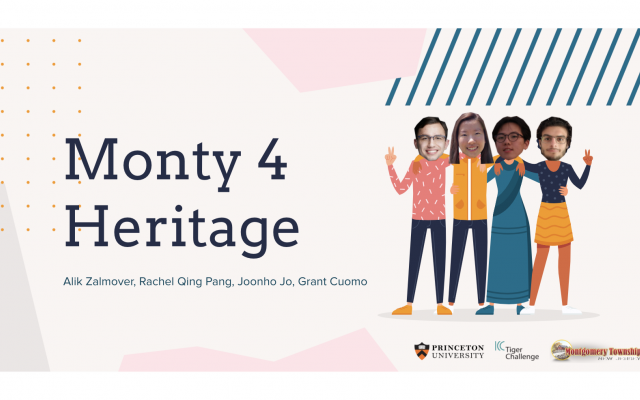
A group of Princeton undergraduates spent ten weeks this summer researching the lost histories of the indigenous Lenape natives and Black Americans of Montgomery Township, New Jersey.
The Lenape people settled in Montgomery Township and the surrounding area between the Millstone and Delaware Rivers and stayed there for over 10,000 years. However, there is no detailed history of their lives and their impact on this land and state. Although numbers vary, the Lenape population in and around Montgomery could have exceeded 10,000 while their descendants make up less than 1% of the township's current population.
Equally lost are the stories and histories associated with Montgomery Township and the Black American narrative. The Underground Railroad brought freed and runaway slaves from the south through Montgomery to settle in the safety of the nearby Sourland Mountains.
These important histories, often lost and rarely included in New Jersey and United States history books, are what the Princeton students spent their summer trying to understand and begin to recapture.
The students worked together this summer as team members in the Keller Center's Tiger Challenge program. Tiger Challenge is a multi-year curricular and co-curricular opportunity for student and community partners to address complex societal issues using design thinking. A human-centered problem-solving suite of tools, design thinking combines qualitative research, interviews, and observation with abductive reasoning, creativity, collaboration, and empathy to help teams develop innovations that have lasting societal impact.
One of those students is Rachel Qing Pang, a rising sophomore who took part in Tiger Challenge while home in Singapore due to the global pandemic. Although the time difference was a challenge, she was energized by the untold stories of the community members she interviewed and her teammates' passion to "bring to light the forgotten and intentionally erased histories of minority groups," Pang said.
Pang felt the importance of this project while conducting her first interview. As she and her teammates listened to indigenous rights activist Arla Patch tell them heartbreaking stories of injustices against the native people, their project's purpose and tone emerged. "All the way from Singapore, through a Zoom screen, I felt her passion and frustration." Although it was difficult, she understood the importance of hearing some uncomfortable truths.
Montgomery Mayor Sadaf Jaffer was part of the proposal process as the team, called Monty 4 Heritage, assembled itself, and then served as team advisor. As the first woman mayor in the United States of South Asian descent, she understands the role of unequal representation in our communities and country.
"Understanding the past helps clarify the present and provide possibilities for the future. This project is very much in line with Montgomery Township's goals to foster inclusivity and a greater understanding of our complex place in the world. The Monty 4 Heritage team has conducted several interviews, presentations, and conversations with the community. I am proud to serve as a partner for this truly collaborative effort," said Jaffer.
As the team moved through the summer, diving deeper into the Montgomery area's complexities and rich history, they understood the importance of opening this dialogue and working towards a solution at this time in history. "Current events, particularly the Black Lives Matter movement, continue to highlight the dire need for change in the treatment of historically oppressed groups in society. My team believes that fair representation of heritage and identity is the first step in creating a more inclusive community," said Pang.
Teammate and rising senior Joonho Jo agrees, "Unequal representation in the United States history has led to the under-education about historically excluded groups. As a result of this, many local stories of heritage and identity have been forgotten over the centuries." This exclusion leads to division and tension within a diverse community.
Grant Cuomo, a rising junior, found value in the design thinking philosophies of conducting research and interviews with sensitivity, enthusiasm, respect, empath, and optimism. An approach that helped create an essential component to this project; trust between the team and the community.
Heading into his junior year, Alik Zalmover hopes this project helps educate the community on the township's full history and serves as a template for other communities. "We are working to create an effective way to portray these forgotten histories," said Zalmover, "to raise awareness about diversity and the importance of learning from as many different perspectives as possible."
The teammates said that this awareness could bring a sense of inclusion to the township.
As the academic year begins, Monty 4 Heritage's team members are committed to continuing to research, interview, and ultimately unearth lost stories.
"When the program began, the students were a little daunted hearing the real history of our area, and some of the stories were difficult to take in," said Jessica Leung, design program manager and instructor for the summer Tiger Challenge program. "The moment they were able pushed beyond the passive role and took pride and ownership of the project was when I felt that they truly got it."
It is evident that this team's work will have a significant impact on Montgomery Township. Ultimately they hope that it may serve as a template for other communities across the country to bring forward stories and histories of the underrepresented and lost voices throughout this country in an effort to create a truly inclusive America.